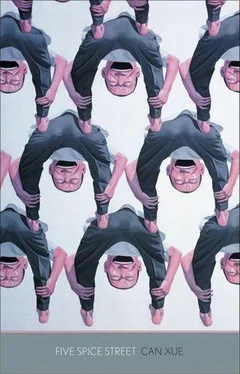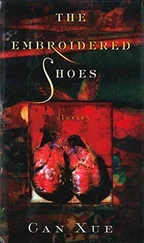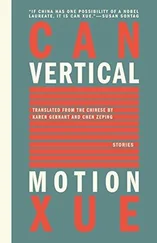Can Xue - Five Spice Street
Здесь есть возможность читать онлайн «Can Xue - Five Spice Street» весь текст электронной книги совершенно бесплатно (целиком полную версию без сокращений). В некоторых случаях можно слушать аудио, скачать через торрент в формате fb2 и присутствует краткое содержание. Год выпуска: 2009, Издательство: Yale University Press, Жанр: Современная проза, на английском языке. Описание произведения, (предисловие) а так же отзывы посетителей доступны на портале библиотеки ЛибКат.
- Название:Five Spice Street
- Автор:
- Издательство:Yale University Press
- Жанр:
- Год:2009
- ISBN:нет данных
- Рейтинг книги:5 / 5. Голосов: 1
-
Избранное:Добавить в избранное
- Отзывы:
-
Ваша оценка:
- 100
- 1
- 2
- 3
- 4
- 5
Five Spice Street: краткое содержание, описание и аннотация
Предлагаем к чтению аннотацию, описание, краткое содержание или предисловие (зависит от того, что написал сам автор книги «Five Spice Street»). Если вы не нашли необходимую информацию о книге — напишите в комментариях, мы постараемся отыскать её.
they
Five Spice Street
Five Spice Street — читать онлайн бесплатно полную книгу (весь текст) целиком
Ниже представлен текст книги, разбитый по страницам. Система сохранения места последней прочитанной страницы, позволяет с удобством читать онлайн бесплатно книгу «Five Spice Street», без необходимости каждый раз заново искать на чём Вы остановились. Поставьте закладку, и сможете в любой момент перейти на страницу, на которой закончили чтение.
Интервал:
Закладка:
She told her sister: ‘‘As for taking great pains to imitate a genius, it would be better for me to sell a few more pounds of peanuts! That benefit would be real…’’ When the people crowded together below the thatched cottage to listen to the genius’s words, she deliberately lowered her head and looked down and went about her work at the snack shop. When someone questioned her, she affected surprise and said that she had never paid attention to public life. Her inner life was so rich and happy that she saw no reason to pay attention to external matters. She ‘‘angrily brushed off’’ the visitor’s hand (the visitor had tried to take her to the thatched hut, saying that this was the closest route to the elites). She chided the visitor for ‘‘interfering in her individual freedom’’ and said that she ‘‘would never take part in such foolish, deceptive nonsense!’’ She wouldn’t waste her energy on this kind of ‘‘pointless thing at the cost of selling one less ounce of peanuts.’’ She had precisely allocated her energy, and this system ‘‘couldn’t be altered.’’ Ruining her system was the same as ‘‘robbing’’ her. She stared at the visitor with her third eye for a long time and concluded that he ‘‘was a dust rag.’’ Then she bent her head and weighed peanuts, paying no more attention to him. Completely unaware of this, the visitor wanted to argue, but Madam X’s husband hit him with a broom handle and threw him out of the shop. ‘‘This dust rag was in the wrong place, and that bothered you. I threw it into the garbage,’’ he said in a leisurely tone.
Now, let’s return to the diagram of the maze. We have followed the thread to where Madam X surveyed the territory, settled on Five Spice Street as a new base, and harmed people with a soft knife. To substantiate this, the writer compared and contrasted her activity with that of geniuses, providing readers with almost ‘‘a complete general understanding.’’ The writer’s work went on smoothly and was about to succeed, but he didn’t guess the new problems he would encounter. The writer’s research suffered a major setback when Madam X gave up her nighttime activities and scurried to the street to proclaim her desire to ‘‘normalize’’ her relationship with the adulterous lover. The result was that people objected to the characterization of her nighttime activities as ‘‘murderous.’’ Someone even joked, ‘‘Nighttime activities? That’s purely her personal bagatelle!’’ People turned their gazes completely from her nighttime activities to the ‘‘adultery.’’
Okay. The writer dropped his research for the moment and followed the gaze of the crowd to Madam X’s new transformation. What was normalization? From the standpoint of the law and of tradition, normalization of male and female relationships = monogamy. Since Madam X already had a husband and hadn’t yet divorced him, how could she normalize her relationship with the adulterous lover? Even if she had said she wanted to ‘‘leave’’ her present husband, that was not at all the same as going through a legal divorce, and there was not the slightest evidence that she intended to go through this procedure. It was said that she ‘‘abhorred’’ this kind of procedure ‘‘from the bottom of her heart.’’ Since she wasn’t going through this procedure and was also wildly involved in adultery, what significance did her normalization have? Did she plan to live with Q for the rest of her life? If we look back for a moment, we will remember that Madam X had been a wanton woman who ‘‘never turned down the men who showed up,’’ ‘‘the more the better,’’ and sometimes she even ‘‘took the initiative.’’ Later, she hooked this Mr. Q, and still later, she announced that she ‘‘was deeply in love with him.’’ But she had overstated it: ‘‘I don’t give the time of day to any counterfeits (other men).’’ It seemed that she would divorce and marry Q, and that she would promptly give up her evil ways and return to becoming a virtuous wife and mother. We have to point out that all through her illicit affair, Madam X had never mentioned ‘‘marriage.’’ Conceivably, she abhors this procedure, too. So we’d better have no illusions or try to bring her into our moral compass. She’d exposed her nature since childhood (‘‘grabbed’’ everything in sight). Now, in her thirties, how moral could she be? Just think about it! She won’t get married, and she won’t bother to get a legal divorce. In other words, she would do whatever she wished-be with anyone she likes, have sex with anyone she wants. This is what she meant by normalization!
There was nothing new at all. Wasn’t ‘‘sexual liberation’’ about just this? Yet, Madam X didn’t seem to be at all about ‘‘liberation.’’
She really scared people with her seriousness. She thought stubbornly: first, she had to normalize the illicit affair with Q by ‘‘leaving’’ her husband (although she didn’t put this into effect, because Q wasn’t taken in). Second, she didn’t have to marry Q legally as long as she carried on the adultery ‘‘in a fair way.’’ That was normalization. Third, she didn’t necessarily ‘‘have eyes for only one person.’’ While having an affair with one person, if another attracted her, she’d happily ‘‘shift’’ right away. (From the beginning, Q could not accept this and often objected. This was one reason they broke up.) At this point, perhaps the readers can’t refrain from shouting: ‘‘Isn’t this the old trick of beggars wrapped in hemp and riding in oxcarts? Those people have lice!’’ X had called a spade a spade and said that she ‘‘liked’’ those beggars with lice. Transposing the concepts of civility and barbarism, she told Q: ‘‘Compared with those people, we are barbarians!’’ Anything that met her needs, she called civility; and anything that stood in her way was barbaric. We can imagine that her future civility was a world of disorder and convulsion. All along, her evil intention was to actualize her ideal blueprint on our Five Spice Street. My dear readers, the new transformation in Madam X isn’t the least bit new! As for her normalization, never mind our elites and ordinary people-even her adulterous lover Q was extremely repulsed by it. That normalization was her invention; it could exist only in her crazy mind. It would be best if she just kept this idea in her brain. Otherwise, she would discover how difficult it was to take even a tiny step. What was new about it? Was it ‘‘new’’ to wear hemp sandals, ride in an oxcart, and be dressed in rags? If she wanted to do it, so what? This had nothing to do with us. But then she wanted to pull Q in and even announced her filthy idea on the street (a certain person calculated that fifty-eight people were contaminated by her. Luckily, Old Meng bore her a grudge because she wanted to occupy his loft, and, with the help of Madam X’s husband’s good friend’s wife, fired a pellet from his slingshot and injured Madam X’s leg. Only this put an end to X’s villainy). Was some other meaning hidden in this stubborn will and perseverance? We should have been on the alert. In half a year she had broken up
Q’s family, while making a big hullabaloo over not wanting at all to tie herself to Q through marriage. She would be satisfied with ‘‘normalization’’ (namely, wearing hemp sandals and riding in an oxcart).
It seemed she had ulterior motives. Everything Madam X did- her so-called adultery-had little to do with Q. It could have been Q, or Y-whoever. Hadn’t she threatened to ‘‘create miracles out of thin air’’? This was precisely what she meant by miracles! Some of our best minds were too conventional-they focused on her secret room and her microscope, assuming her ‘‘miracles’’ were created there. A slight shift in perspective would have puzzled them. Madam X used this as the opportunity to act speedily: she changed the place, the time, the methods, and objective and went to that dark, gloomy place to ‘‘create miracles’’! She crowed over it: ‘‘This is way more brilliant than using the microscope!’’ (She said this to her sister.) She drew her curtains, making the room airtight to prevent anyone from hearing or seeing a thing. She told her husband to pretend to guard the door. If an outsider charged in, she confused him with dream talk. Even the writer almost fell for her trick, while ordinary people absolutely believed in her feint.
Читать дальшеИнтервал:
Закладка:
Похожие книги на «Five Spice Street»
Представляем Вашему вниманию похожие книги на «Five Spice Street» списком для выбора. Мы отобрали схожую по названию и смыслу литературу в надежде предоставить читателям больше вариантов отыскать новые, интересные, ещё непрочитанные произведения.
Обсуждение, отзывы о книге «Five Spice Street» и просто собственные мнения читателей. Оставьте ваши комментарии, напишите, что Вы думаете о произведении, его смысле или главных героях. Укажите что конкретно понравилось, а что нет, и почему Вы так считаете.












